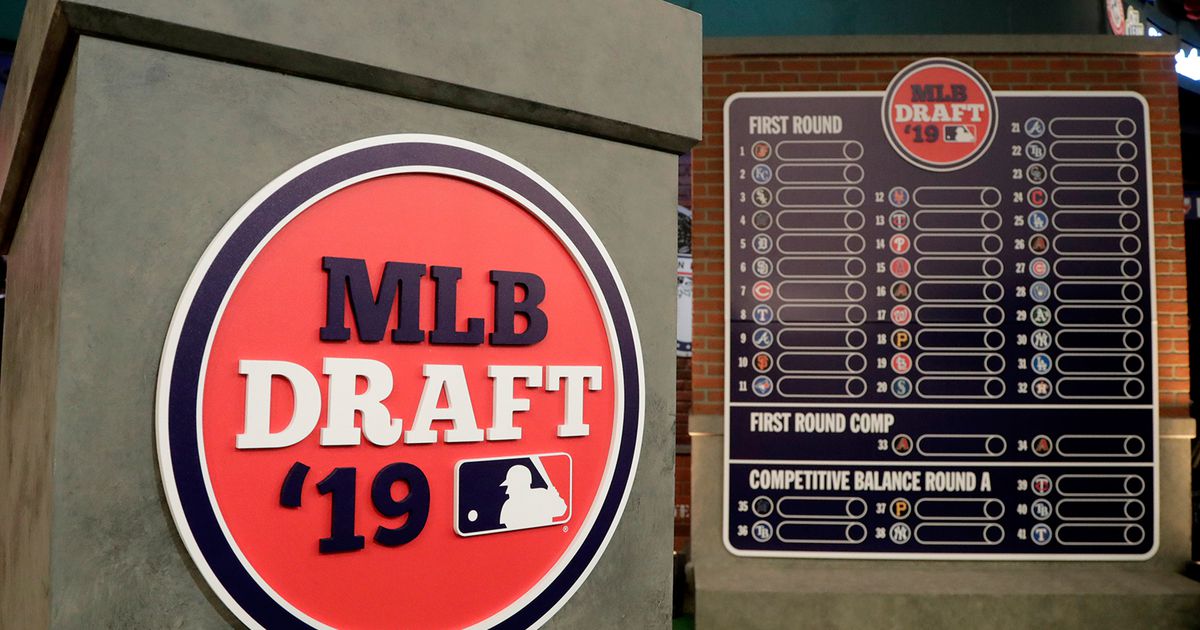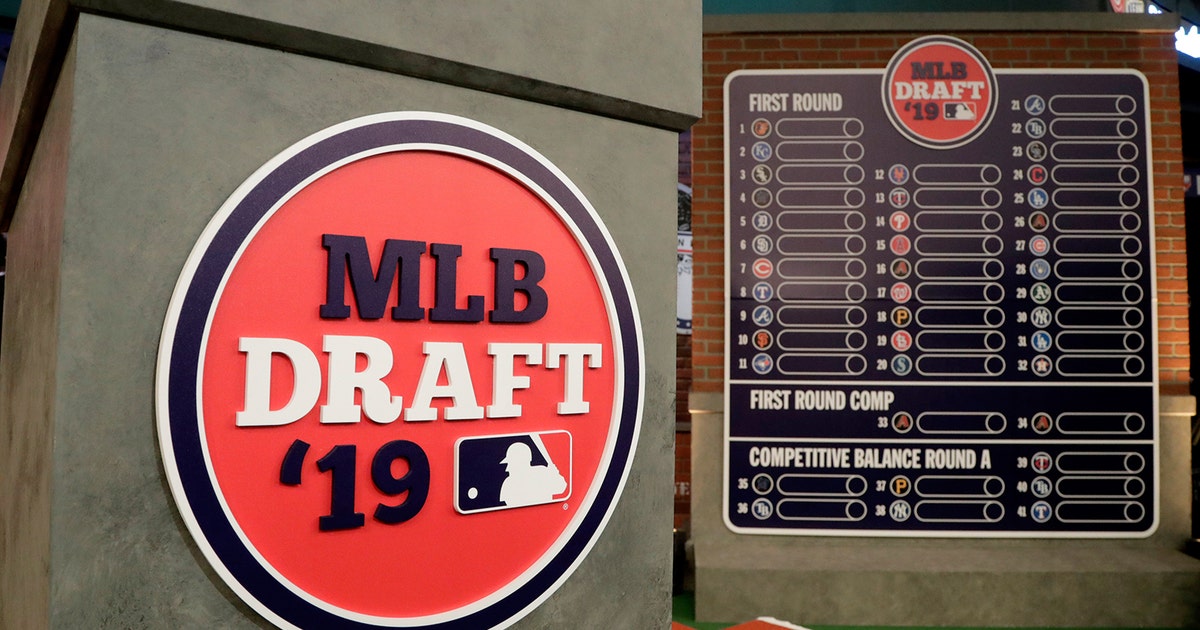Braves front office pivots to college position players with top 2019 picks


ATLANTA — It’s a new day in the Atlanta Braves draft room.
Dana Brown, the organization’s new vice president of scouting, and Atlanta’s front office selected college position players with their two first-round picks on Monday night, ending the pitching-centric run over the previous 10 years by drafting Baylor catcher Shea Langeliers and Texas A&M shortstop Braden Shewmake.
“The strength of the draft is the college position players this year,” Brown said after the franchise drafted a position player in the opening round for the first time since Braxton Davidson in 2014. “We don’t draft based on system and what we have.”
Atlanta followed this draft’s strengths directly into a fitting complement to its farm system’s deepest position, landing a catcher of the future nominee at No. 9 overall who grades out as the top defensive backstop in his class. Throw in offensive upside and Langeliers not only fits the prototypical “best player on our board” mantra but also helps address a long-term system need.
“We think we can get him here quick to the big leagues. We think he’s that type of player. It’s elite defense,” Brown said. Langeliers is the organization’s highest drafted catcher since 1989 No. 2 overall pick Tyler Houston. “ … Plus-plus arm. Plus-plus defense. High IQ. Big-time makeup. High-energy type player. Just a good package for the franchise.
“We think with this pick we can potentially solve the catching position.“
#Braves VP of scouting Dana Brown on Shea Langeliers: “Plus-plus arm. Plus-plus defense. High IQ. Big-time makeup. High-energy type player.”#MLBDraft pic.twitter.com/nxfCGSGorG
— FOX Sports: Braves (@FOXSportsBraves) June 4, 2019
The Braves followed that pick up with Shewmake, their first infielder drafted with a first-round pick since 2006, and another shortstop in the second round with Oregon State defensive standout Beau Philip. “Best Player Available” talking points set aside, it’s impossible not to note the (inevitable) deviation in a trend that helped define the Braves’ successful rebuild.
From 2015 to 2018, five consecutive first-round picks were spent on pitching: Kolby Allard, Mike Soroka, Ian Anderson, Kyle Wright and Carter Stewart. Atlanta did not sign Stewart, their 2018 top pick who eventually signed a long-term deal in Japan to potentially circumvent the draft process and MLB’s minor-league system altogether, which led to Monday night’s compensation pick at No. 9 overall, potentially the last top-10 pick the organization holds for the foreseeable future given the early success of its young core and a strong farm system. In fact, nine of the team’s previous first-round selections were devoted to arms dating back to Mike Minor in 2009.
The Braves have also used two compensation-round picks (Joey Wentz, A.J. Minter) and 12 additional picks in the first five rounds, including Bryse Wilson and Kyle Muller, to bolster their minor-league pitching ranks over the previous four drafts.
Now Atlanta features two top-tier catchers to pair with its stockpile of arms.
With William Contreras, a 21-year-old at High-A who has earned top-100 prospect consideration in his own right, already in place, the Langeliers selection adds another option given the team’s long-term question marks behind the plate with veterans Tyler Flowers and Brian McCann on short-term contracts. General manager Alex Anthopoulos can now operate knowing he has two of the top catchers in minor-league baseball on the way.
“There’s more to the mental side of the game when it comes to catching: Calling pitches, scouting reports on hitters, working with the pitching staff, individual pitchers, stuff like that. I was kinda drawn to that,” Langeliers said after being drafted. “ … I feel like I was kinda built to be in that spot physically and mentally.”
Brown has tracked Langeliers since high school and, while his calling card is in his defensive ability, the Braves have been impressed with his offensive improvement. The Baylor junior owns a .904 OPS with 10 home runs this season and the team believes there’s more power there.
For his part, Langeliers credits the work he’s been putting in since the summer of his freshman year — even when those efforts were partially derailed by a broken hamate bone in his receiving hand suffered during the second game of the 2019 campaign.
“Coming off my freshman year I was a majority pull hitter. Freshman summer in the Cape Cod League with the Chatham Anglers, worked that whole summer on just hitting the ball where it’s pitched, thinking (hitting to) right-center, staying inside the ball, stuff like that,” Langaliers said. “Sophomore year there was a learning curve there. Kind of got in my own head a little bit, struggled a little bit. … Obviously starting off my junior year with a broken hand wasn’t ideal, but I think it turned out to be pretty good.”
Joining Langeliers in the draft class is another Texas product in Shewmake, who the team profiles as a shortstop with utility potential. The franchise had not spent a top-25 pick on a shortstop since Hall of Famer Chipper Jones went first overall in 1990.
#Braves VP of scouting Dana Brown believes first-round pick Braden Shewmake can provide positional versatility: “I would grade him out at least above average with a chance to be plus (defensively at shortstop).”#MLBDraft pic.twitter.com/sFrYRN8UJD
— FOX Sports: Braves (@FOXSportsBraves) June 4, 2019
“Braden is an athletic shortstop and I love that even though he’s a college guy we think he has high upside based on the loose, wiry frame that he has,” Brown said. “We think he’s going to put on some strength. We think he’s going to get to some more power. He’s really good at the position, above average to plus defender. And what people don’t know is that this guy can actually run. He’s definitely an above-average runner. So I think it’s a nice package of upside, athleticism and power coming down the road for this young man.”
Shewmake, who earned All-America honors during his freshman season with the Aggies, tallied 72 extra-base hits with 32 stolen bases in college. The 6-foot-4 Texas A&M product is embracing his utility potential, particularly since it’s a role that’s afforded him extra playing time on big stages in the past.
“I think being able to play a bunch of different positions will allow you to get in the lineup a lot easier,” said Shewmake, who noted his utility role during his time with the USA Baseball Collegiate National Team. “I played first base for a couple games while (No. 3 overall pick) Andrew Vaughn was out. Played second base for quite a few games and then went over to third whenever (No. 8 overall pick) Josh Jung needed a break.”
Following the international sanctions, the loss of the 2018 third-round pick and not signing Carter Stewart, this is a pivotal draft for Atlanta.
As the organization’s best prospects continue to bubble up to the high minors, success at the major-league level could in turn prevent the organization from landing top-10 talent like Langeliers in future drafts.






